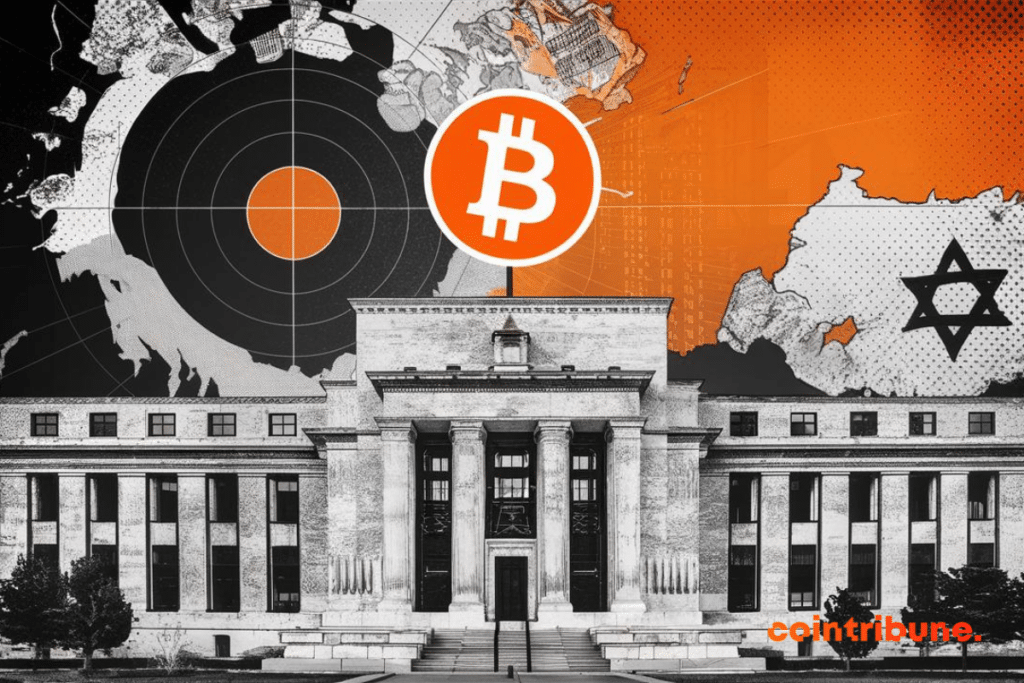JUST IN: Federal Reserve Chair Jerome Powell says that an interest rate cut may come as early as September. 😳 pic.twitter.com/n8OY5vsykc
— Simply Bitcoin (@SimplyBitcoinTV) July 31, 2024
A
A
The Fed Facing the Conflagration in the Middle East
Thu 01 Aug 2024 ▪
6
min read ▪ by
▪
Investissement
The brewing war in the Levant likely prompted the Fed to be cautious. Is the petrodollar at risk? What about bitcoin?

The Fed is still worried about inflation
The American central bank has kept its key rate unchanged. It has now been at its highest (5.50%) for a year.
This decision was widely telegraphed by FOMC governors. They have maintained the verbiage used since January to oppose rate hikes.
“The Committee considers that it is not appropriate to cut rates until greater confidence has been gained regarding the sustained convergence of inflation towards the 2% target”, reads the statement.
Jerome Powell, however, hinted that rates could drop from the fall onwards. A first cut is potentially envisaged in September:
To summarize, we could see a rate cut in September if inflation decreases further. A “significant slowdown” in the labor market could also prompt the Fed to cut rates. But if inflation persists and the economy remains “solid”, rates will stay the same.
Annual inflation is currently 3% in the United States. You have to go back to February 2021 to find a figure below 2%.
Overall, inflation has been 25% since January 2020. In other words, Americans’ purchasing power has collapsed by 20% in less than four years!
“The job is not done when it comes to inflation, but we can afford to start easing the key rates”, said J. Powell.
Eyes on the oil price
The Fed is cautious. It knows that Israel’s repeated provocations (violating Palestinian prisoners, assassinating the Hamas leader in Tehran, massacres of children, etc.) could spark a war.
Former Russian President Dmitry Medvedev has also given his nod to this scenario, which is also favored by Washington:
“The noose is tightening in the Middle East. I am pained by all these innocent lives taken hostage by a disgusting state: the United States. It is clear to everyone that war is the only way to achieve a fragile peace in the region”, he said on X.
The threats from the region’s military heavyweights are also becoming increasingly insistent. The Iranian president warned of “heavy consequences” if Israel attacks Lebanon. Turkish President Erdogan threatened to “enter Israel, as we entered Karabakh and Libya.”
Knowing that the price of a barrel could soar if the region ignites, and that global inflation depends directly on the price of oil. Indeed, 95% of global transport is gasoline-powered…
Christyan Malek, head of energy equity research for the EMEA region at JPMorgan, warned against $150 oil if OPEC cuts its oil production in retaliation.
Inflation would then rise again, forcing central banks to raise rates in return. Here is a graph showing the strong correlation between the price of oil and inflation:
What happens if the price of oil rebounds to $100?
Did the Fed leave itself any margin for error?”
Embargo or end of the petrodollar and emergence of bitcoin?
It is not impossible that Arab nations, instead of shutting off the tap, simply stop accepting the petrodollar. In other words, we would see a decline in the dollar rather than a rise in the price of oil.
Let’s not forget that Iran, Saudi Arabia, Egypt, and the United Arab Emirates have recently joined the BRICS. This organization is only open to countries with the intention of purging the dollar from their trade exchanges.
Russia no longer holds Treasury bills in reserve, and China stopped accumulating them in 2013. Since then, Chinese reserves of Treasury bills have fallen by 41%. The Saudi kingdom, for its part, reduced its reserves of Treasury bills by 25% since 2020.
Furthermore, around 40 countries want to join the BRICS. Such a crowd would make it possible to launch a new international payment system competing with the SWIFT network. However, this is no small feat…
Given the difficulties of this Herculean project, bitcoin has the advantage of already existing with impressive daily volumes. In this regard, the recent legalization of international payments in bitcoins by the Russian Parliament is not insignificant.
The United States understands well that bitcoin can replace American debt as international reserve currency. This is why President Trump has resigned himself to embracing bitcoin as a reserve currency. Accumulating it at a low price before others would give the dollar some respite.
We are on the brink of a reset of the international monetary system. Many nations regret financing American debt with their reserves. Despite the empire’s warlike postures, it will soon have to close its massive trade deficit and reduce its standard of living.
The international political context will only calm down when all nations trade on equal terms, willingly or by force. Don’t miss our article: “The Fed prohibits Iraq from using its dollars and yuan.”
Maximize your Cointribune experience with our "Read to Earn" program! For every article you read, earn points and access exclusive rewards. Sign up now and start earning benefits.
A
A
Bitcoin, geopolitical, economic and energy journalist.
DISCLAIMER
The views, thoughts, and opinions expressed in this article belong solely to the author, and should not be taken as investment advice. Do your own research before taking any investment decisions.